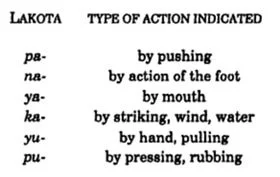k'onih'azi
/[k'onihʔazi]
A newly wed beaver couple, that is, a male beaver and a female beaver who have recently formed a union and built a lodge together.
Carrier/Dakelh – 600 speakers – central British Columbia, Canada
The Carrier region is full of streams and woods suitable for beaver, and beaver are plentiful. European contact was motivated largely by the desire for the pelts of beaver and other fur-bearing animals. Traditionally, Carrier people hunted beaver primarily for the meat, especially the tail, which is rich and fatty, which may be off-putting to non-locals but is appealing to people accustomed to a cold, northern climate. Carrier people know a great deal about beavers and have an elaborate terminology for them. More about Carrier.
Source: field notes from work with the late Harry Pierre
Credit: Bill Poser

